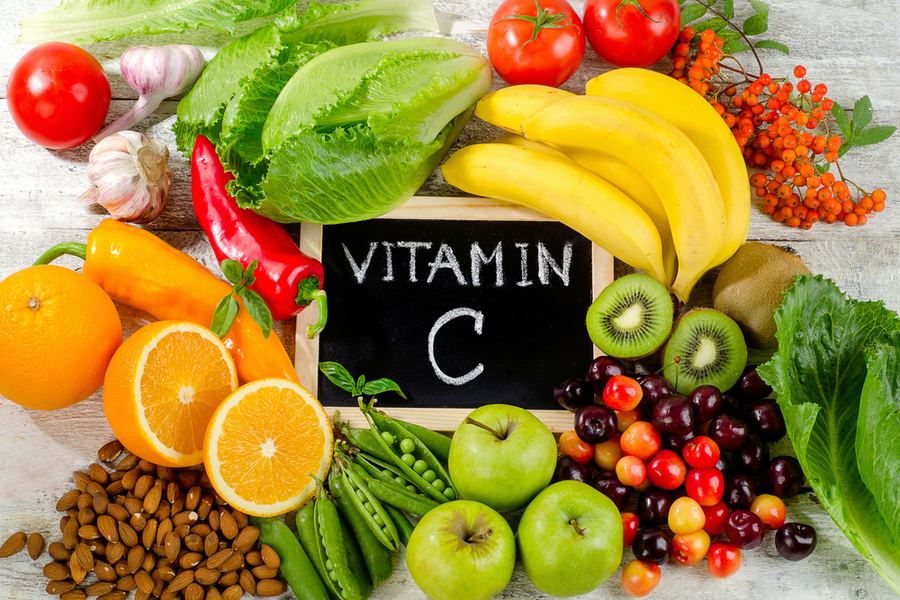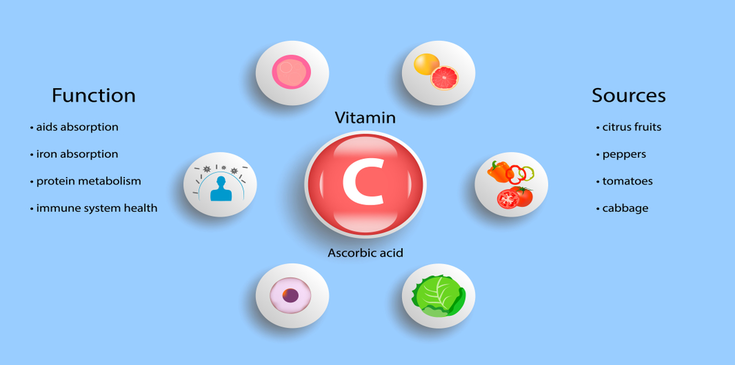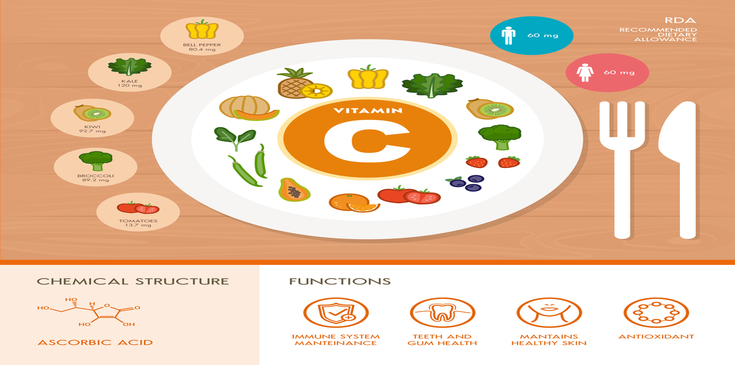Vitamin C – a water-soluble vitamin that is also called L-ascorbic acid is very crucial to a proper human life. Unfortunately, unlike most mammals, human beings cannot synthesize their own vitamin C, so it’s essential to source it from other hosts.
Occurring naturally in various plants, fruits, and vegetables, this vitamin is found abundantly (nowadays).
From playing a role in boosting our immune system, promoting collagen production to more significant acts like preventing a person from suffering from scurvy or lessening the chances of suffering from cardiovascular disease, vitamin C has got it all covered.
Apart from that, even though vitamin C is not proved to prevent common cold (for a usual and healthy person) but it does improve the symptoms and the overall recovery time.
In this article, we are going to exclusively discuss Vitamin C function first and also some sub-topics related to it.
Vitamin C functions in the body.
As already discussed, from a well functioning immune system to preventing scurvy, vitamin C has a part to play in all.
Vitamin C helps in cell growth and recognition, it is essential in the biosynthesis of collagen (this is an important component for the connective tissues in our body), and various neurotransmitters.
As stated a while ago, vitamin C also acts as an antioxidant that protects our cells from damage induced by free radicals, build up of which can cause some serious problems down the road like certain cancers and heart diseases.
Antioxidants help delay the process of developing those serious conditions. Moreover, they can help get rid of the pollutants like smoke residue (from pollution or cigarettes).
Vitamin C has also been noticed to regenerate other antioxidants in the body like vitamin E (alpha-tocopherol).
The immune system of our body is also another component that’s benefited from this particular nutrient, it’s shown that vitamin C helps boost the immune system which in turn allows the body to fight with outer infections more efficient and vigorously.
An adequate and regular intake of vitamin C can improve the recovery period and also the symptoms.
But it’s not proven to prevent any kind of infections so far, at least not in the case of a typical healthy citizen.
One thing to note is – a person who is involved in activities which can make him/her more susceptible to infection (like marathon runners, ice skiers etc) vitamin C has shown to cut half of their chances of suffering from a medical condition.
Apart from those, vitamin C helps the body to metabolize iron (from non-heme iron sources) more efficiently by reducing it to a more ferrous form and also decreases bad cholesterol (LDL) along with triglycerides in our body.
Vitamin C has also role is also played in keeping our gums, hair, and skin overall healthy.
Vitamin C Deficiency
Vitamin C has a part to play in various vital functions of our body.
Deficiency of vitamin C, although rare nowadays but is still plausible if an individual’s diet contains very limited variety. People with certain behaviors like regular smoking or chronic conditions like malabsorption are more susceptible to this deficiency.
A condition called “scurvy” is what predominantly occurs when a person is in a vitamin C deficit. Usually, if a person’s daily intake of vitamin C is under 10 mg for longer than a month, then the person can start showing early signs of scurvy.
Because of ascorbic acid deficiency now the body is unable to properly produce collagen thus, the connectivity tissues start to get weaker. This causes poor wound healing, hyperkeratosis, hairs looking like corkscrews, ecchymoses. purpura, and joint pain.
Some early symptoms are fatigue, gingivitis, malaise. Other symptoms are bleeding of gums, loosening of teeth (due to tissue weakening), and swollen joints.
Due to the now compromised immune system, the body will be more susceptible to outer infections. Bone strength is also likely to be affected (in a bad way).
Iron deficiency condition “anemia” can become intermittent. And the patient’s skin will be much more prone to bruises that take a long time to properly heal.
Moreover, depression and a bad mood can also be an outcome of this condition.
Also, read about
- Vitamin A| Function| Source| Deficiency in detail.
- Vitamin D| Function| Source| Deficiency in detail.
- Vitamin E| Function| Source| Deficiency in detail.
- Vitamin K| Function| Source| Deficiency in detail.
What is Vitamin C?
Vitamin C (C6H8O6) is essentially an organic compound (it has carbon in its formation) that is categorized under the water-soluble vitamins.
This indicates that this particular nutrient has to be taken in a regular manner or else deficiency of it can occur. This is due to the fact that water-soluble vitamins cannot be stored for a longer period of time, and is excreted via urine.
Vitamin C is also called L-ascorbic acid; ascorbic is derived from the new Latin word “scorbutus” which means scurvy. It also acts as an antioxidant in the body – protecting cells from radical damages (damages inflicted by free radicals).
Historically, people were not aware of vitamin C (obviously) but some did know that a certain kind of fruit (mainly lemon) helped tremendously with patients suffering from scurvy (which was prevalent in sailors, back in the day).
Later vitamin C was isolated and acknowledged as the nutrient present in the miraculous fruit that was helping in the cure.
Best sources of Vitamin C
Earlier, there used to be fewer choices available on the food table due to which it was difficult to fulfill the required quota of the essential nutrients. Fortunately, nowadays that isn’t the case anymore. There are tons of varieties available in the market. One just has to visit the nearest store and get them.
Here are some of the best sources of vitamin C:
Vegetables
Asparagus, broccoli, cabbage, red cabbage, cauliflower, tomato, kale, spinach, bell peppers, potato, parsley, Brussels sprouts,
Fruits
Orange, lemon (other citrus fruits), kiwi, Kakadu plums, cantaloupe, apple, berries, watermelon, honeydew, guava, lychees, papayas, strawberries.
Fortified Foods
Bread, cereals, whole grains.
Dosage
An adequate amount of vitamin C is essential for the proper functioning of our body. And because it’s a water-soluble vitamin, it needs to be replenished regularly.
Recommended daily allowances (RDA) are issued by the National Institute of Health (NIH) as a standardized intake amount according to the respective age and gender.
Males are recommended to take 80-100 mg per day
Females are recommended to take 70-90 mg per day.
Summary
Vitamin C is a water-soluble vitamin, which also acts as an antioxidant.
From boosting the immune system to preventing chronic cardiovascular diseases, this nutrient plays a role in all.
Vitamin C is also known as ascorbic acid.
Though it’s not proven that if vitamin C can help to prevent an infection, but there is evidence that supports that it can actually help improve the recovery period and also the symptoms.
Although deficiency of this vitamin is rare nowadays, a person who does not take an adequate amount of this nutrient on a regular basis can still suffer a condition called “scurvy” can occur.
Some symptoms are fatigue, swollen parts on the skin, corkscrew hair, loosening of teeth, inflammation in the gums, anemia, depression, bad mood.
There are certain standardized amounts of vitamin C suggested by the NIH. These amounts will be enough to fulfill the needs of the respective citizen according to their age and gender.
The amount can also alter due to conditions like pregnancy and lactation in which the person will generally require more amount of vitamin C.
Nowadays, there are plenty of varieties of food (which contains ascorbic acid/vitamin C) to choose from. Therefore it’s not hard to fulfill this requirement in your body.
Some of the best sources are different citrus fruits, asparagus, tomato, dark green leafy vegetables, cabbage, and papaya.


